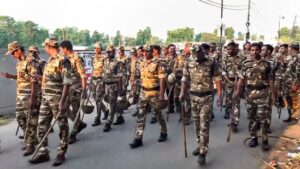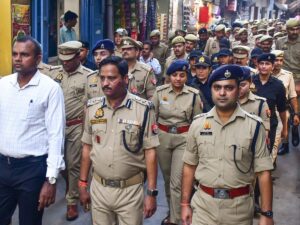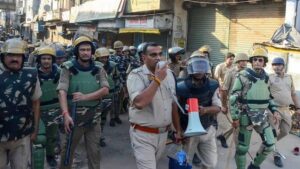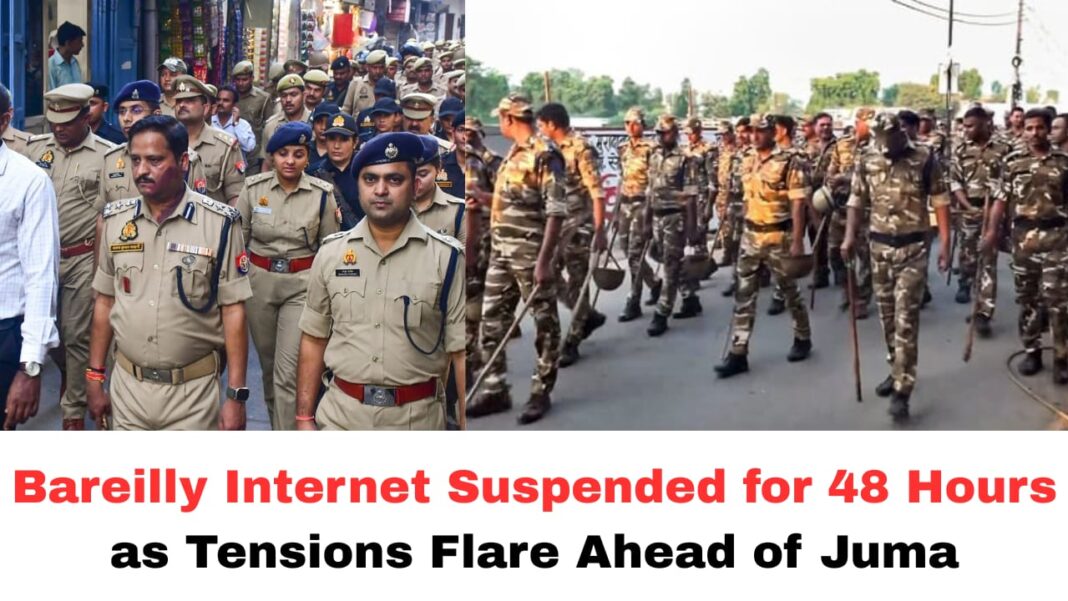Digital News Guru Uttar Pradesh Desk:
Tension in Bareilly: Internet Shutdown, Drones & Security Measures Ahead of Friday Prayers
Bareilly, Uttar Pradesh — In a move reflecting deep concerns over communal peace and public order, the administration in Bareilly has imposed a 48-hour suspension of internet, mobile data, broadband, and SMS services from 3 PM on October 2 until 3 PM on October 4. This measure is intended as a preventive step ahead of Friday (Juma) prayers, amid fears that digital platforms could be misused to incite unrest.
Security forces have also been substantially reinforced. Drones are being used to monitor sensitive zones, and a visible deployment of police, Provincial Armed Constabulary (PAC), and Rapid Action Force (RAF) has taken place across the district and in adjacent areas. Officials note that four districts in the Bareilly division (including Shahjahanpur, Pilibhit, and Budaun) have been placed on high alert.

At the heart of the tensions is a controversial incident involving posters bearing the message “I Love Muhammad.” In late September, a protest was organized in the Kotwali area after Friday prayers. It drew some 2,000 people and escalated into stone-pelting and clashes with police. The protest was reportedly called off by cleric Tauqeer Raza Khan. In subsequent police action, about 81 persons have been arrested in connection with the unrest.
Local sources also report that in the days following the disturbances, at least 38 shops—many from minority communities—were sealed by authorities citing encroachment violations. Shop owners allege that these actions are retaliatory.
Why the authorities acted
The government has defended the shutdown as necessary to prevent the spread of inflammatory content via social media and messaging apps. Social media platforms such as Facebook, YouTube, and WhatsApp might be “misused to spread rumours and incite communal tension.” The order was issued under Section 7 of the Indian Telegraph Act, 1885, along with the Temporary Suspension of Telecom Services Rules, 2017.
Officials also emphasized the heightened risk posed by the fact that Dussehra festivities coincide with the period of tension, leading to large public gatherings (Ramleela grounds, Durga Puja fairs, Ravan Dahan, etc.). The use of drones is intended to augment surveillance and provide situational awareness in real time.
Authorities have asked local residents to avoid spreading rumors and to cooperate with the administration. Divisional Commissioner Bhupendra Chaudhary warned that any lapse in security would invite stern action.

Impacts & public reaction
The internet blackout has predictable side effects on commerce, communication, education, and daily life. Digital payments, banking apps, messaging, and work-from-home arrangements are disrupted—an inconvenience to ordinary citizens. Small traders, particularly those relying on e-commerce or digital transactions, are among the worst hit.
The closure of shops and sealing of premises has further aggravated economic anxieties, especially among communities feeling targeted. In addition, some political voices have criticized what they see as heavy-handed tactics. The Bhim Army’s chief accused the government of using police power to silence victims and suppress opposition voices.
Critics argue that while preventive measures are sometimes justified, blanket shutdowns create a chilling effect on civic life and suppress legitimate speech. They contend that alternative measures—such as targeted injunctions, fact-checking, community outreach, or stricter content moderation—could mitigate risks without imposing mass disruption.
The road ahead and risks
The situation remains tense, and the coming hours will be crucial. Friday prayers carry symbolic and practical weight in communal settings, and any flare-up could quickly escalate.
Authorities may extend the shutdown if the security environment demands it. Also, surveillance via drones and heavy policing may stoke unease among residents, especially from minority groups who feel disproportionately affected.

Politically, the episode could fuel debate over the balance between security and civil liberties. State governments in India increasingly resort to internet shutdowns during unrest—but human rights groups routinely challenge them as overbroad and detrimental to rights of expression.
If handled sensitively, a path toward de-escalation lies in transparent communication, assurances to vulnerable communities, reopening of communications services as soon as feasible, and efforts to rebuild trust. Otherwise, the crackdown risks deepening divisions and feeding a narrative of state overreach.
You May Also Read: Direct flights between India and China to resume by October-end after a gap of 5 years








